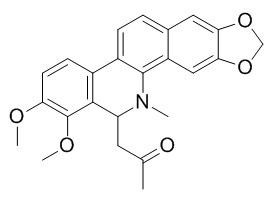6-Acetonyldihydrochelerythrine
6-Acetonyldihydrochelerythrine exhibits significant antioxidant activities, it exhibits significant anti-HIV activity in H9 lymphocytes with EC50 and TI (Therapeutic Index) values of 1.77 microg/mL and 14.6, respectively. 6-Acetonyldihydrochelerythrine is a potent inducer of apoptosis in HCT116 and SW620 cell lines, it displays potent cytotoxic activity in human HCT116 and SW620 colon carcinoma cells, to a higher extent than 5-fluorouracil (5-FU), the cornerstone chemotherapeutic agent in colon cancer.
Inquire / Order:
manager@chemfaces.com
Technical Inquiries:
service@chemfaces.com
Tel:
+86-27-84237783
Fax:
+86-27-84254680
Address:
1 Building, No. 83, CheCheng Rd., Wuhan Economic and Technological Development Zone, Wuhan, Hubei 430056, PRC
Providing storage is as stated on the product vial and the vial is kept tightly sealed, the product can be stored for up to
24 months(2-8C).
Wherever possible, you should prepare and use solutions on the same day. However, if you need to make up stock solutions in advance, we recommend that you store the solution as aliquots in tightly sealed vials at -20C. Generally, these will be useable for up to two weeks. Before use, and prior to opening the vial we recommend that you allow your product to equilibrate to room temperature for at least 1 hour.
Need more advice on solubility, usage and handling? Please email to: service@chemfaces.com
The packaging of the product may have turned upside down during transportation, resulting in the natural compounds adhering to the neck or cap of the vial. take the vial out of its packaging and gently shake to let the compounds fall to the bottom of the vial. for liquid products, centrifuge at 200-500 RPM to gather the liquid at the bottom of the vial. try to avoid loss or contamination during handling.
CZECH MYCOLOGY2021, 73(1):1-19.
Int J Mol Sci.2024, 25(12):6456.
J AOAC Int.2021, 104(6):1634-1651.
Molecules.2023, 28(13):4972.
Food Science and Biotechnology2023, 2023:1007
Molecules.2020 ,25(16):3697.
Trop J Nat Prod Res, February2023, 7(2):2371-2381
Front Immunol.2018, 9:2655
Plants (Basel).2021, 10(7):1376.
Biomolecules2021, 11(10),1513.
Related and Featured Products
Planta Med. 2003 Feb;69(2):148-52.
Two new protopines argemexicaines A and B and the anti-HIV alkaloid 6-acetonyldihydrochelerythrine from formosan Argemone mexicana.[Pubmed:
12624820]
METHODS AND RESULTS:
Antioxidative activity-guided fractionation together with chemical analysis led to the isolation of three benzophenanthridine alkaloids from methanol extract of the bark of Bocconia arborea. Identification was based on spectroscopic methods. The isolated alkaloids 6-Acetonyldihydrochelerythrine, chelerythrine and dihydrochelerythrine were tested for antioxidative activity on thiocyanate assays, free radical scavenging activity, β β β β β-carotene bleaching method, and deoxyribose assay.
CONCLUSIONS:
All alkaloids exhibited significant antioxidant activities in linoleic acid and β β β β β-carotene. Although afforded protection against the damage of deoxyribose, liposome peroxidation and microsomial lipid from peroxidation, also exhibited scavenging effects on the 1,1-diphenyl-2-picrylhydrazyl radicals.
Ars Pharmaceutica,2003,44(1):5-21.
Actividad antioxidante de los alcaloides de Bocconia arborea. Estudio sobre seis métodos de análisis Antioxidant activity of alkaloids from Bocconia arborea. A study on six testing methods[Reference:
WebLink]
METHODS AND RESULTS:
Antioxidative activity-guided fractionation together with chemical analysis led to the isolation of three benzophenanthridine alkaloids from methanol extract of the bark of Bocconia arborea. Identification was based on spectroscopic methods. The isolated alkaloids 6-Acetonyldihydrochelerythrine, chelerythrine and dihydrochelerythrine were tested for antioxidative activity on thiocyanate assays, free radical scavenging activity, β β β β β-carotene bleaching method, and deoxyribose assay.
CONCLUSIONS:
All alkaloids exhibited significant antioxidant activities in linoleic acid and β β β β β-carotene. Although afforded protection against the damage of deoxyribose, liposome peroxidation and microsomial lipid from peroxidation, also exhibited scavenging effects on the 1,1-diphenyl-2-picrylhydrazyl radicals.
J Nat Prod. 2014 Jul 28.
6-Acetonyldihydrochelerythrine Is a Potent Inducer of Apoptosis in HCT116 and SW620 Colon Cancer Cells.[Pubmed:
25066282]
Three flavones [Desmethoxycentaureidin (10), eupafolin (11), and 6-hydroxyluteolin (12)] from the latter.
METHODS AND RESULTS:
Antiproliferative activity of the isolated compounds against murine melanoma (B16F10), human gastric adenocarcinoma (MK-1), and human uterine carcinoma (HeLa) cells was estimated. (+)-Anymol (3), acteoside (4), isoacteoside (5), arenarioside (8), eupafolin (11), and 6-hydroxyluteolin (12) had GI50 values of 10-16 microM against B16F10 cell.
CONCLUSIONS:
Desmethoxycentaureidin (10) and eupafolin (11) showed high inhibitory activity against HeLa cell growth (GI50 9 microM, and 6 microM, respectively).



